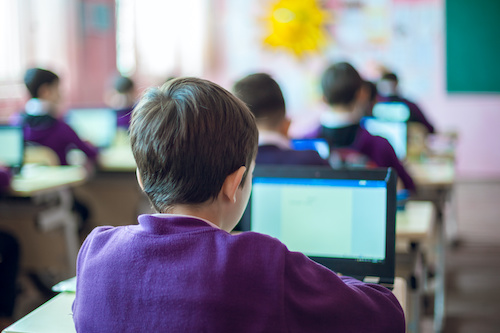Key points:
- Educators are looking forward to a new year and plan to focus on growth
- Edtech tools have become critical for student engagement
- See related article: 5 edtech tools to save time this year
Educators are optimistic about implementing new education technology tools, including AI and gamified learning, and are prioritizing student engagement as the new school year gets underway, according to a new survey from GoGuardian.
The survey of more than 1,100 educators from across North America highlights back-to-school excitement, challenges, student engagement, and technology usage.
As educators welcome students back to their classrooms for the 2023-2024 school year, they are continuing to embrace education technology. More than 93 percent of those surveyed reported they are somewhat or very likely to implement an educational technology product they have never used before. Educators mentioned a total of 149 different technology products when asked what they plan to use, including gamified learning solutions, new digital presentation tools, ChatGPT, and a variety of classroom management platforms.
Regarding AI, half of teachers say AI features will not impact their likelihood of adopting a product, while 38 percent say AI increases the likelihood of them adopting a product. Teachers are most interested in seeing AI applied in education technology for the purposes of content creation, followed closely by use in interventions, data analysis, and lesson planning.
“In our new back-to-school educator survey, we aim to connect with teachers and learn about their priorities, concerns, and challenges. As a learning company, it’s essential to consistently listen to the educator experience,” said Mariana Aguilar, vice president of education at GoGuardian. “With the tumultuous years of the pandemic behind us, we’re encouraged to hear that teachers are optimistic about the current state of student engagement compared to last year.”
Other key findings from the survey include:
- Educators continue to recognize student engagement as a top priority. When asked about their biggest challenge in the coming year, 45 percent of teachers predicted that motivation and engagement will be their top issue, while 24 percent anticipate the biggest classroom challenge will be digital distractions, such as students’ personal phones.
- Technology has become a critical engagement tool for many teachers. Sixty-four percent of teachers said they were “somewhat” or “very” concerned about losing technology resources in their classrooms this year due to funding cuts, and the majority of those noted their primary concern around technology loss is how it would impact classroom engagement.
- Students want collaboration and gamification. When asked about what students are most excited about in their classrooms, 74 percent of teachers responded that students are excited about collaborating with one another, while 73 percent of teachers surveyed said students were excited about gamified learning, in which students are motivated by introducing game-like elements into the learning process.
- Teachers are committed to their own growth. When teachers were asked what they themselves were most excited about, 37 percent noted they were excited to see their students, and 32 percent said they were most looking forward to using new teaching techniques.
- We’re at a turning point. Of teachers surveyed, 92 percent believe that students will be more or equally engaged this coming school year when compared to last, citing the distance from the pandemic and continued familiarity with in-classroom learning. Teachers also noted their own professional development and implementation of new engagement strategies will play a role in classrooms’ increased engagement.
“As we move further from the effects of the pandemic and remote learning, I’ve found that student engagement has consistently improved,” said Amy Weston, a language arts teacher in Michigan. “Purposeful learning can happen when we help students invest in their own learning. This year, with improved personal responsibility and more established relationships and room for collaboration, I’m hopeful that I will continue to see stronger engagement and ultimately better learning outcomes in my classroom.”
This press release originally appeared online.
Related: Driving equitable learning with thoughtful software implementation
- Friday 5: Virtual field trips - April 26, 2024
- Google, MIT RAISE launch no-cost AI training course for teachers - April 26, 2024
- 4 ways to support work-based learning - April 23, 2024

